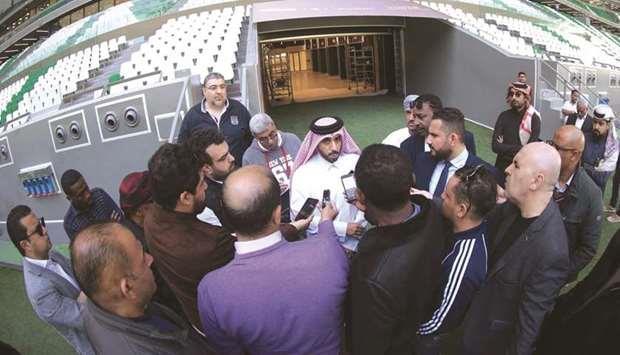
Qatar- Media delegations tour Education City Stadium
(MENAFN- Gulf Times) The Supreme Committee for Delivery & Legacy (SC) organised a visit for the local and foreign press delegations to the Education City Stadium, a FIFA World Cup Qatar 2022 stadium, on the sidelines of their coverage of the TOTAL CAF Super Cup match between Esperance Sportive de Tunis and Zamalek SC of Egypt in Doha yesterday.
A large number of various local media outlets as well as news agencies were present during the visit which introduced them to the advanced stages of work in the stadium, which is almost ready and awaits its official opening date.
The SC had also taken the local and foreign press delegations on an introductory tour of Al Bayt stadium located in the city of Al Khor, as part of its strategy to introduce Doha visitors to all the details related to the stadia.
SC's Education City Stadium Project Manager Eid al-Qahtani escorted the media on a tour to learn about the stadium's facilities and provide them with more information about the stadium.
The landscape around Education City Stadium is dotted with leading universities, as part of Qatar Foundation for Education, Science and Community Development (QF) where cutting-edge research is conducted and academics inspire their students to be at their best.
QF students, faculty and staff will be able to use these facilities. For decades to come, Education City Stadium will be a symbol of innovation, sustainability and progress, in line with the Qatar National Vision 2030 and the goals of both QF and the SC.
The Education City Stadium Project Manager confirmed that the stadium has been fully completed and that remaining minor work is scheduled to end at the end of the first quarter of this year, noting that the stadium has a capacity of 45,000 spectators, with advanced cooling system and all its facilities are now fully ready.
The stadium's most direct contribution to international development will come after it has hosted matches through to the quarter-finals stage of the tournament. The arena's capacity will be reduced by half and 20,000 seats will be donated to build stadiums in developing countries, helping cultivate a passion for the game around the globe. This reduction in capacity will also add to the intimate, inclusive feeling created by the venue's ultramodern curves, which will encircle fans and keep the atmosphere firmly in the arena.
The Education City Stadium has a design that draws on the rich history of Islamic architecture, blending it with striking modernity. The facade features triangles that form complex, diamond-esque geometrical patterns, appearing to change colour with the sun's movement across the sky.
The stadium's location within the Education City has been carefully chosen with accessibility in mind, particularly for fans with disabilities. Irrespective of what mode of transport they use, fans will only travel a short distance to their seats along shaded, tree-lined paths — giving them just enough time to enjoy a spectacular view of the venue.
The training pitches, and other sporting facilities radiate outwards from the stadium, all within easy reach of the local academic community.
Education City is the home of QF, one of the key stakeholders of the SC. The Project Manager for the stadium is ASTAD Project Management, while FIA Fenwick Iribarren Architects served as the lead designer. The Design and Build Contractor is JPAC JV, who appointed Pattern as the lead design architect and BuroHappold for engineering design.
All these organisations are focused on collaborating closely to create a truly inspiring stadium, with sustainability at its heart.
The stadium will guide the way for others by using smart building systems, with an integrated water and energy control and monitoring system to manage real-time consumption. Environmentally aware design and construction practices will help reduce the stadium's carbon footprint — not only during construction but also throughout its lifetime.
The SC has made huge contributions to green construction practices here. At least 55 percent of the materials used for the stadium project will come from sustainable sources and 28 percent of construction materials have recycled contents, minimising the carbon footprint of the stadium. Across the precinct, drought-tolerant and native species of plants have been used in 75% of the landscaping.

Legal Disclaimer:
MENAFN provides the
information “as is” without warranty of any kind. We do not accept
any responsibility or liability for the accuracy, content, images,
videos, licenses, completeness, legality, or reliability of the information
contained in this article. If you have any complaints or copyright
issues related to this article, kindly contact the provider above.

















Comments
No comment